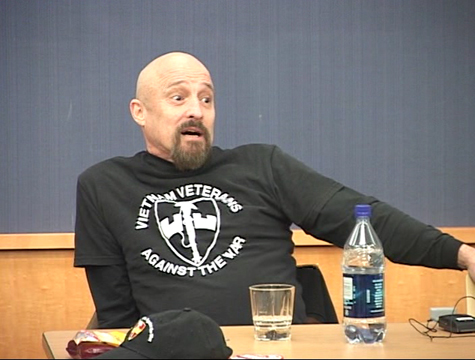 |
Building the Antiwar Movement: From Vietnam to IraqBy Brian GryzlakIowa City, Iowa In February 2003, millions across the world rallied against the impending US-led invasion of Iraq. The US-led "coalition of the willing" dismissed global public opinion. Most of the US population and indeed the majority of globe were then, and are now, calling for an end to the war on, and occupation of Iraq. Four years later the occupation of Iraq continues. Many in the antiwar movement are revisiting tactics and clarifying messages in order to build the movement into something that ruling elites can not ignore. Barry Romo and Aaron Hughes came to Iowa City, Iowa in February to discuss the positions, strategies, and tactics of the antiwar movement. Aaron is a former sergeant with the 1244th Transportation Company, Illinois National Guard, and was in Iraq for a total of 15 months. Romo is a former Vietnam War army infantry lieutenant and a national coordinator of VVAW. The event was organized by the University of Iowa Antiwar Committee and sponsored by six other local organizations. Roughly 100 people came out to the Iowa City Public Library to hear them speak. Early on, Aaron addressed the main tenet for the US-led invasion: "I always knew that there weren't any weapons of mass destruction because one of my army manuals said that." Both Aaron and Barry were asked to share how they came to oppose the respective wars they fought in. Both discussed the difficulties of transitioning to civilian life and the deep and complex personal issues that accompanied their realization that the reasons for going to war turned out to be lies. Barry shared the issues that he faced during his deployment to Vietnam, and the process of channeling his antiwar sentiment into action: "I got to Vietnam and within two weeks I knew that it was not what I thought it was going to be. . . The people didn't want us there." He added that one of the most difficult things for him was to attend his first antiwar demonstration.
Aaron noted, "It took me a long time to join IVAW [Iraq Veterans Against the War]. When I got back I felt like I didn't have the right to say anything. Everyone told me I'm a hero. Everyone said 'Thank you for your service,' and how do you counter that? How do you say 'Don't thank me for that crap. I'm not a hero. I'm guilty. I'm part of this messed up thing.' " Aaron explained, "As long as we're there, no matter what government is established, it's always going to be underneath our rifle, and as long as that happens, the Iraqi people aren't going to accept it." He continued, "Stopping the funding [for the war] is the one way…one tactic that we as the people need to use and need to make our Congressmen and women use to stop the war." Aaron talked about art as an historically powerful way of making sense out of the experience of war: "I think art historically has been a space…to challenge the cultural norms. The Dada artists after World War I, they got up there and said, 'You know what, WWI made no fucking sense at all,' and the only way to express the traumas of this war is to have nonsensical poetry, to stand up and just yell and scream, and make noises that made no utter sense but that was the best chance they had at expressing what they went through, and the insanity of fighting people that lived across…an imaginary line." Barry made an appeal to approach the antiwar struggle as part of broader struggles towards betterment of society through challenging sexism, racism, and homophobia. "You can't allow the prejudices that exist among us to stop us from having a society where we're all accepted as human beings, and where we all have the basic rights and privileges," he said. Barry drew from his experiences of years of organizing in addressing the frustration that those in the antiwar movement sometimes face: "Sometimes we can think we aren't winning people over; and we never know where the struggle is going to go anymore than the people who get us into wars know where the struggle is going to go. But the only way we're going to beat them is by constantly talking to our neighbors…by constantly bringing new people forward. You can never be satisfied with the number of people you have …." The event was a huge success, as judged by attendance as well as the many comments from folks who attended. Indeed, the main message of the forum was that veterans speaking out against the war are a powerful part of the antiwar movement, and that providing such space is clearly part of the answer to the question of what needs to be done. Brian Gryzlak is a research assistant at the University of Iowa (Iowa City, Iowa) and a member of the University of Iowa Antiwar Committee.
|


